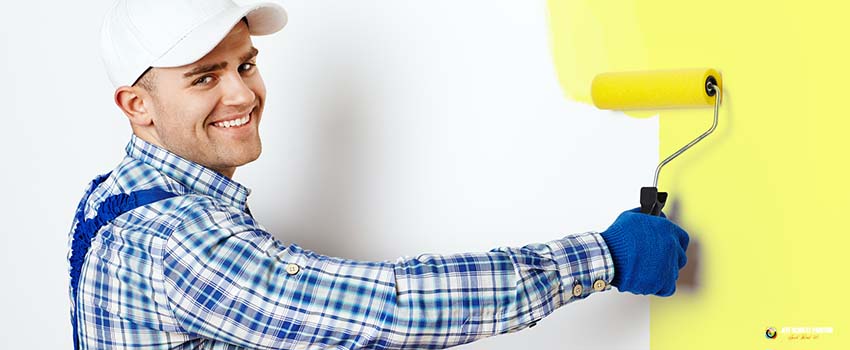When it comes to painting the inside of your house, there are hundreds of options. Color choices can be affected by personal preference, existing color schemes of furniture and art, and room purpose. Another critical consideration is that the paint color you select does not have a negative impact on your mood.
Throughout recent years, it has been shown that paint colors that boost your mood can have a major impact on influencing your emotional state. In color psychology, specific colors might make us feel more active or soothing. Some even cause feelings of rage or melancholy. The saturation or purity of the hue and its brightness level influence the sorts of emotional impulses. A wall painted with a low saturation hue, such as brilliant green, will, for example, create a tranquil, relaxed atmosphere. A more vibrant but more subdued sapphire blue color will excite you.
Psychological Impact of Colors
Color psychology has indicated that different colors can possibly increase our mood, make us feel peaceful, or even evoke violent or depressive emotions. But what is the source of these reactions? People usually have comparable sensitivities to particular colors and groupings of colors.
According to Psychology Today, the paint colors that boost your mood, and its effect on your emotional state, are entirely dependent on the saturation (how pure a color is) and brightness (how light color seems) levels of the color. When room colors reaches the ideal combination of saturation and brightness, they can elicit the desired emotions when you spend time in different spaces of your house. Here are a few of such examples of mood colors being utilized:
Painting your walls a less intense, vivid green hue will help you feel more relaxed and tranquil.
If you paint your walls a more saturated, less intense blue hue, you will feel more invigorated.
Common Mood Paint Colors
When painting the interior of your home, it’s critical to pick mood paint colors properly since the hues you choose will affect you, your family, and everyone else who spends more time inside. When painted on your walls, these mood colors appear to elicit more good reactions.
Warm and Cool Colors
You may recall that all colors fit into two fundamental categories: warm and cold from elementary school. In a color mood chart, it is essentially the same.
Warm hues are connected with heat and sunlight. These are excellent colors to paint your room with as they create a welcoming, pleasant, bright, and dynamic environment. The three primary warm colors are:
- Red
- Yellow
- Orange
Cool colors are associated with nature, such as water, sky, and plants. These can also be good colors to paint your room with because they provide a soothing and pleasant atmosphere. These are the actual cool colors:
- Blue
- Green
- Purple or Violet
Of course, each one of these fundamental hues has hundreds of variants in the color mood chart— each with different effects. There are other extremes, such as white and black. Let’s take a look at the fundamental mood paint colors and how it influences emotional state. Selecting the correct color for the space, you’re painting will help you achieve the vibe you desire.
Red
When you paint a room red, you will elicit sentiments of enthusiasm. It is exciting and inspires others to talk about it. Because red is a powerful hue that stimulates adrenaline, it will boost your energy level. Here are some beautiful areas to apply red paint tones:
- An entrance to make an excellent first impression
- Great rooms, completed basements, dens, and other recreational areas
- Dining areas
- Cooking areas (if you want to add some spark)
- Because red tints tend to increase blood pressure and pulse rate, they aren’t always appropriate for bedrooms or other areas where relaxation and rest are prioritized.
Yellow
Because yellow is connected with sunshine, it evokes sentiments of warmth and enjoyment, much like a sunny summer day. Soft yellows may make a place feel cheerful and inspiring. If you paint a brighter yellow space, it may evoke unpleasant feelings such as rage or irritation. Where yellow is effective:
- Kitchens
- Bathrooms
- Dining rooms
Because of the unpleasant emotions, it might evoke, employ caution when using bright yellow in infant nurseries and bedrooms. To decrease the negative impacts of a yellow room, choose a milder shade of yellow or blend a little quantity of bright yellow with other colors.
Orange
Orange is a mix of red and yellow; therefore, it has characteristics of both. It may be energetic and enthusiastic like red, but it can also be warm and inviting like yellow. As a result, orange is an excellent hue for the rooms mentioned above. It is also an excellent choice for a gym or fitness area.
Blue
Blue is a hue that inspires emotions of calm. Consider looking at the blue sky or being near an ocean or lake—doesn’t it make you feel better simply thinking about it? Blue tends to calm breathing, heart rate, and blood pressure. However, use caution since deeper blues might cause sorrow and depression. Blue works nicely in the following areas:
- Bedrooms
- Bathrooms
- Offices
- Spas
Green
Because green is plentiful in nature, it conjures ideas of rebirth and expansion. Because green is created by combining blue and yellow, it combines the cheerfulness of yellow with the relaxing and serene qualities of blue. Green paint ideas for rooms include:
- Bedrooms
- Bathrooms
- Rooms for families
- Spa facilities
- Porches with screens
Violet
Violet is a color that combines blue and red. Because they are both chilly and warm hues, the feelings they evoke vary depending on the shade of purple.
Lighter colors, such as lavender, can calm the environment and are ideal for bedrooms and other areas where relaxation is desired.
Darker colors, like red, energize the space, so employ them in areas where vigorous discussion and activity are needed. Darker purple colors are linked with royalty, therefore rooms in such hues will look more opulent.
White
White represents innocence, freshness, and well-being. Anxiety can be induced by completely white rooms. Choose an off-white tint or blend it with other colors to balance the harsh look to reduce unpleasant feelings.
- When black covers the entire room, it may seem dreary. Painting one wall or trim may lend refinement and relaxation to a space.
- In the realm of paint colors, grey is the new beige. It has warm undertones that make a living room more inviting and pleasant.
Improve Your Mood with Professional Interior Painting Services
While selecting the perfect room colors for your home’s interior might elicit favorable emotions, color is only one aspect of the painting process. Delegating your painting job to specialists ensures that the best colors and shimmers are selected and that your paint color will stay.
To help you fret less, unwind, and love your new paint colors for the coming years, our skilled house painters in Sarasota, FL, provide the knowledge and equipment to complete a flawless paint job. Contact us now!









